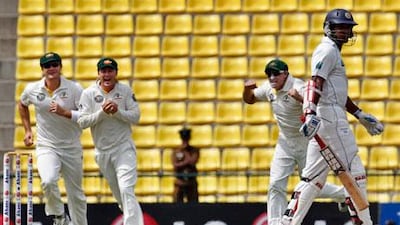What has Sharad Pawar done for Indian cricket?
To discover that, we need to look at the "Vision" statement that was circulated soon after Pawar's team took the reins of the Board for Cricket Control in India (BCCI) in 2005 before relinquishing them in 2008.
It included the following excerpt: "As a premier national sports body, the board had been a model for all others sports organisations, but of late it has invited scorn from the public. In a fast paced world driven by market forces, we have to gear up to meet the ever increasing challenges and aspirations of a cricket-crazy nation.
"When the country is getting excited about the Right to Information Act, the Board is being ridiculed for its lack of transparency.
"Unless we believe in the free flow of information, particularly when millions and millions of rupees are involved, we are bound to be misunderstood.
"There can't be a better start to the new-look board than resolve that everything we do from hereon will be transparent and in the game's and public interest, be it election or allotting television rights or the team selection. The buzzword should be 'Transparency'."
Now, as India's sports ministry tries to make more associations accountable for their actions, the BCCI insists that the Right to Information Act is not applicable to them. A ramshackle website has a page purporting to show its accounts. "Coming soon," it says.
So much for the buzzword.
Given that Pawar is a politician, broken promises should surprise no one. But as Indian cricket moves forward, it faces challenges far greater than just being open about where its considerable funds go.
The other great lie of our age, perpetuated by the BCCI and most other cricket boards, has been "the primacy of Test cricket".
Anyone who believes that presumably also thinks the woolly mammoth can still be found in Siberia.
Whether Test cricket is the most challenging form of the game is irrelevant.
The reality is that five-day cricket has been subsidised by its one-day cousin for decades now. England, with its smaller stadiums and a clearly defined cricket season, may still attract healthy crowds for Test matches involving two or three nations, but the outlook elsewhere is increasingly bleak.
Initiating a Test championship to give games context, or starting day-night games, as proposed by the MCC, is not going to change anything. Those behind such moves are romantics, reluctant to accept that their sweetheart is as unappealing to a new generation as an 80-year-old Miss Havisham.
A day-night Test may be played between New Zealand and Zimbabwe in Napier early next year, with an orange ball having been trialled. In so many ways, it's a step into the unknown.
Will the new ball swing early and will it turn as much as its red cousin once it gets scuffed? What impact will evening dew have on proceedings?
In Asia, where Test audiences have declined over the past decade and more, changing the match timings is just a Band-Aid solution.
In growing economies where people are expected to work as many hours as they can, there is little difference between a game ending at 4.30pm and another ending at 8pm.
The real issues behind Test cricket's decline have never been addressed. India, in particular, never bothered to create a Test culture, even when the popularity of the format was at its peak. You have to go back to 1987 for the last five-Test series at home.
The following year, this correspondent sat in a makeshift bamboo gallery at the University College Grounds in Thiruvananthapuram as the West Indies thrashed India in one match of what was a seven-game one-day series. A fifth Test had been removed from the itinerary to make room.
For a Test-cricket aficionado working in Bangalore's Electronic City, clocking off work a little early serves no purpose either. The rush-hour traffic is so horrendous that he or she would face three hours on the road to get to the Chinnaswamy Stadium and back. It's not remotely the same as popping up to Lord's or The Oval from London's commercial hubs.
Back in 2004, Pakistan-India Tests were scheduled in 40°C heat, during school exams. Needless to say, few turned up.
There are also ethical issues involved in promoting day-night cricket in countries where vast sections of the population go without even basic electricity.
Test cricket, like opera or cinema, will always have a niche following. Accept that. We need honesty, not grandiose vision statements.

